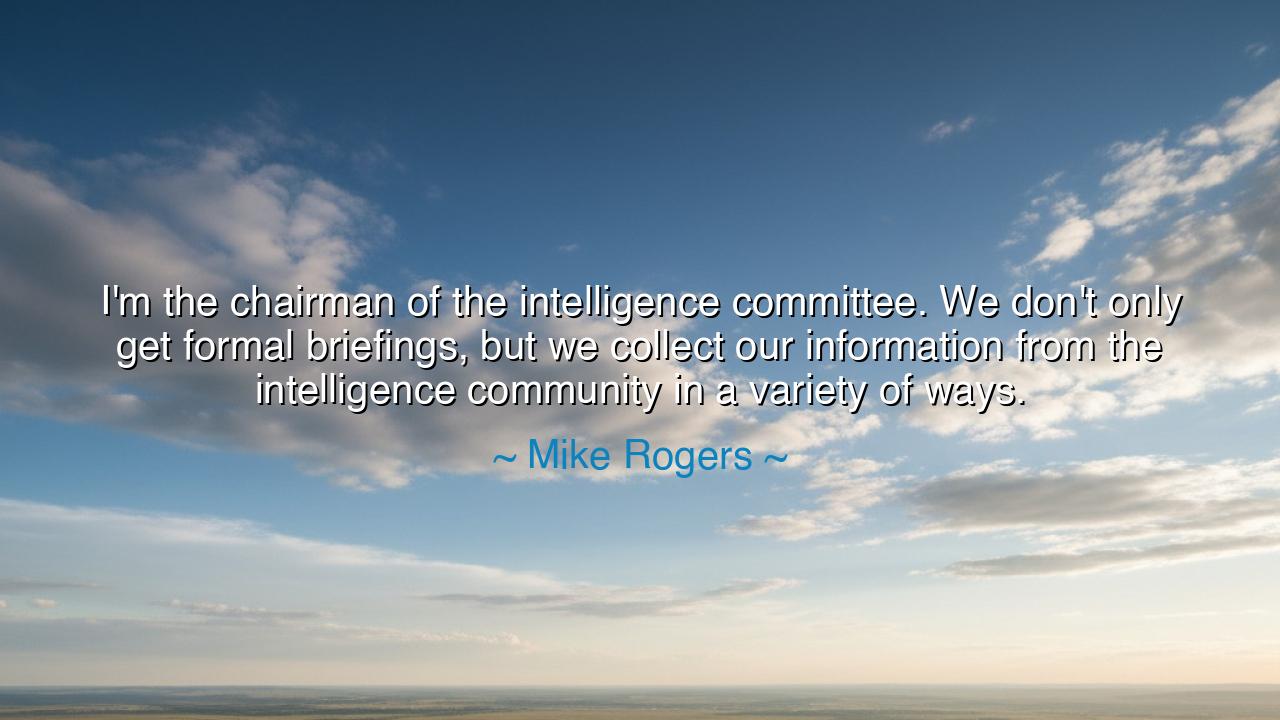
I'm the chairman of the intelligence committee. We don't only get
I'm the chairman of the intelligence committee. We don't only get formal briefings, but we collect our information from the intelligence community in a variety of ways.






The words of Mike Rogers, spoken from the high chamber of governance, hold a truth as old as civilization itself: “I’m the chairman of the intelligence committee. We don’t only get formal briefings, but we collect our information from the intelligence community in a variety of ways.” To the untrained ear, this may sound like a statement of procedure, a note of bureaucracy. Yet beneath these words lies the heartbeat of wisdom—the understanding that knowledge is not a single stream but a vast river, flowing from many hidden sources. Rogers, speaking as one entrusted with the nation’s secrets, reminds us that the work of understanding the world requires not just authority, but humility—the willingness to listen deeply, to gather truth from every whisper, every shadow, every voice.
In ancient times, the kings and rulers of the earth relied on their own intelligence communities, though they bore other names: spies, scouts, messengers, sages. But the wisest of these leaders knew that truth rarely walks in daylight. It hides in murmurs, in the subtle movement of men’s hearts, in the quiet tremor of the world’s unseen currents. To govern well, one must learn to read what is unspoken—to see beyond the formal, to grasp the truth that moves beneath the surface of ceremony and report. Rogers’ words, though modern, echo this same timeless lesson: that wisdom is not found in a single scroll or speech, but in the art of discerning patterns between countless fragments.
The intelligence community, in the world of nations, is like the nervous system of the body—it senses danger before the eyes see, it feels tremors before the earth shakes. But what Rogers reveals is that this network of knowledge must be interpreted through both intellect and intuition. A chairman, a leader, must not merely receive briefings—he must seek understanding in a variety of ways. He must read between lines, question assumptions, and weigh every source against the gravity of consequence. In this, the modern statesman mirrors the philosopher, the poet, the prophet—all seekers who strive not for facts alone, but for meaning.
Consider the tale of King Solomon, whose name has endured as a symbol of wisdom. When confronted with two women claiming the same child, he received no “formal briefing.” He listened, observed, and then devised a test—not to gather information, but to reveal truth. His wisdom lay not in the reports of others, but in his ability to collect understanding from the living heart of the situation. So too must those who bear the burden of leadership discern truth from the chorus of voices—some loud, some quiet, some deceptive. For as history teaches, a single false report can doom an empire, but one well-heard truth can save a nation.
Rogers’ words also speak to a deeper human lesson beyond the chambers of power. Every man and woman, in their own way, serves as the chairman of their own intelligence committee. We, too, receive “briefings” from the world—through news, through friends, through our own perceptions. Yet if we listen only to the loudest or most official voices, we miss the subtle truths that shape our lives. Wisdom demands that we learn from every source—from the stranger on the road, from the lesson of failure, from the silence between events. Like Rogers’ intelligence committee, we must collect knowledge from a variety of ways, for truth rarely comes as a single message—it must be assembled from fragments, tested, and understood through reflection.
There is also humility in his statement. For even the chairman—the one who leads, who holds authority—acknowledges dependence on others. No man, no matter how high his office, can see the whole picture alone. This humility, this willingness to listen and gather, separates the wise leader from the arrogant one. It recalls the lesson of the Roman general Fabius Maximus, who saved his people not by charging forward blindly, but by patiently observing, by learning from the movements of his enemy and the murmurs of the land. He gathered intelligence not from pride, but from patience—and in so doing, became known as the Delayer, the man who conquered through understanding rather than haste.
Therefore, O listener, learn from this teaching. In every aspect of your life, be your own intelligence committee. Seek truth not from one voice, but from many. Question. Observe. Reflect. Do not mistake authority for knowledge or noise for clarity. In your relationships, in your work, in your pursuit of meaning—listen as Rogers listened: widely, attentively, with a mind open to all perspectives. For wisdom, like intelligence, is not delivered whole; it is gathered piece by piece, from the winds and the whispers of the world.
And remember this final truth: the strength of a nation, like the strength of a soul, depends on its willingness to know before it acts, to listen before it judges, to understand before it decides. In that way, we honor the spirit behind Rogers’ words—that the pursuit of knowledge, in all its forms, is the foundation of wise action. Let us therefore seek to be not only informed, but enlightened; not only listeners, but discerners of truth. For in the gathering of knowledge with humility and faith, the light of true intelligence is born.






AAdministratorAdministrator
Welcome, honored guests. Please leave a comment, we will respond soon